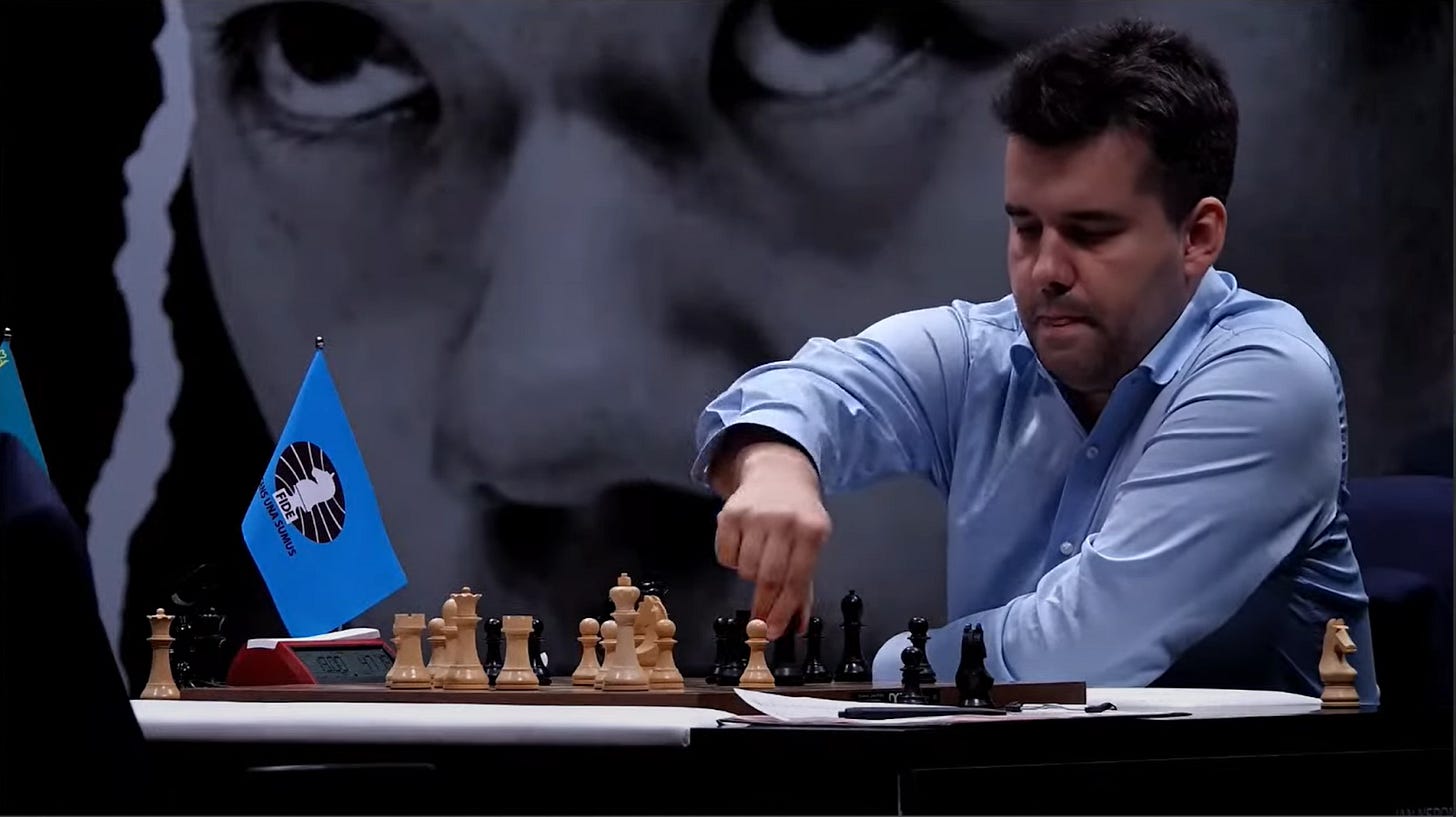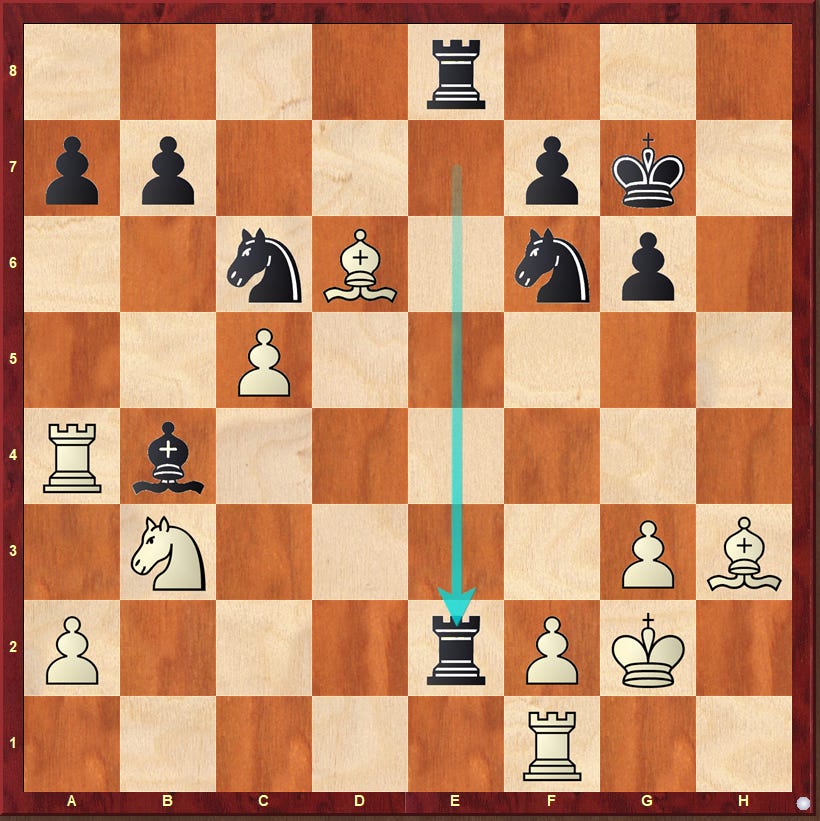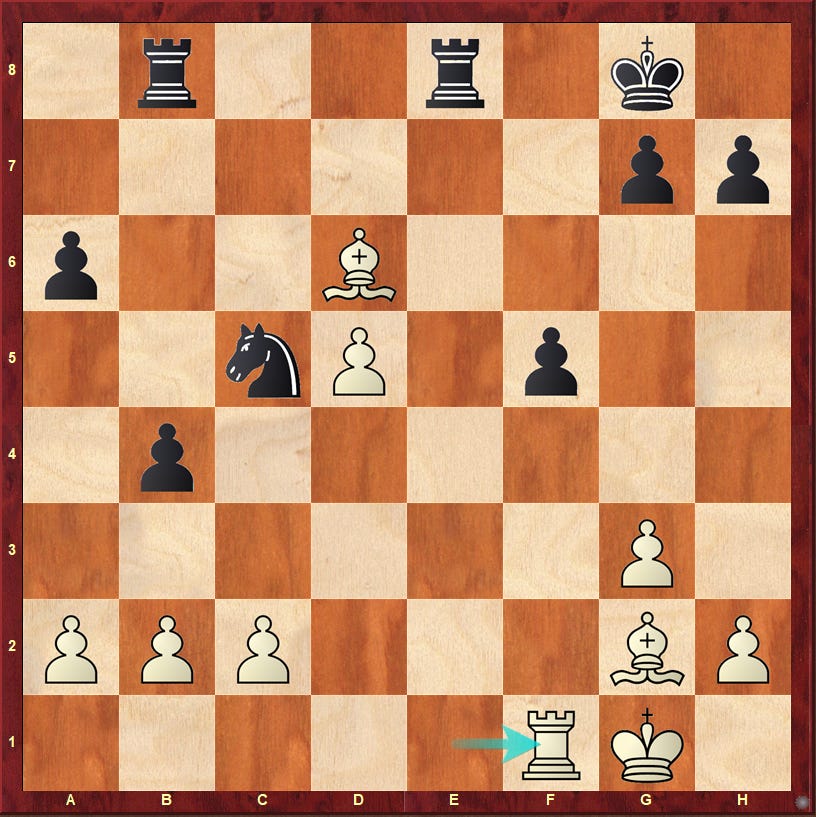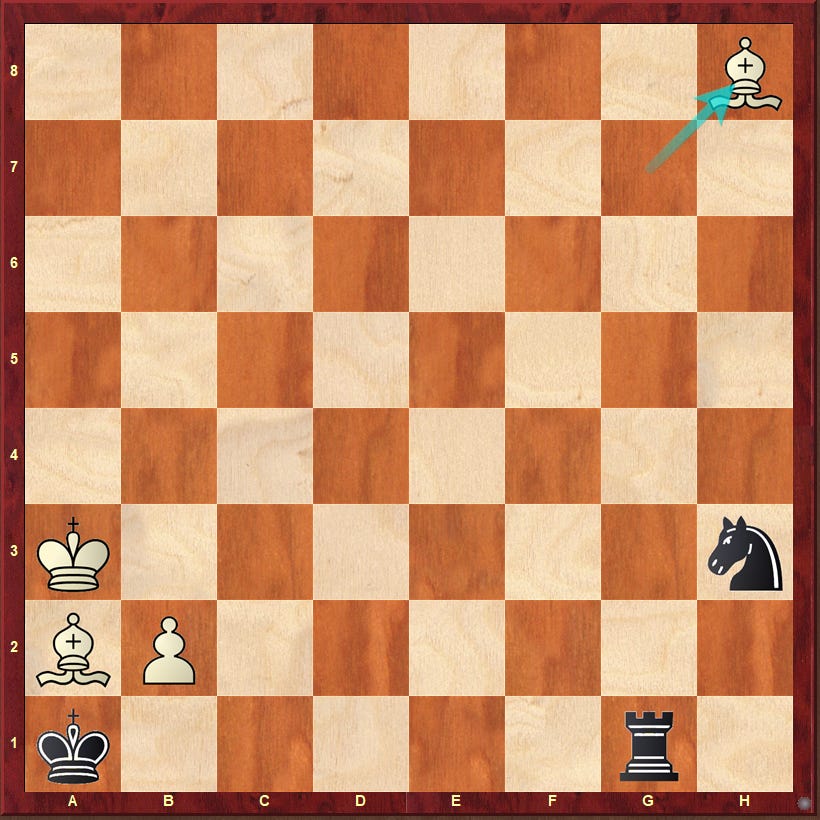The Marshall Spectator

In This Issue:
From The Skittles Room
King's Kibitzes by FM Alex King
IOC Includes Chess in E-Sports Olympics
Déjà Vu at the April Masters by Han Schut
Chess Toons
En Passant
Problem of the Week
Editor's Note
Welcome back, fellow chess players, to this edition of the Marshall Chess Club's fortnightly bulletin, The Marshall Spectator.
April is National Autism Awareness Month. The Marshall Chess Club will host a panel called 'Chess on the Spectrum' on April 25, 2023 with Dr. Joel Sneed, Pranav Shankar and IM Justin Sarkar.
Following the panel discussion, IM Justin Sarkar will conduct a simul, the proceeds of which will be donated to Autism Speaks.

(Pictured above: IM Justin Sarkar)

(Pictured above: Dr. Joel Sneed)

(Pictured above: Pranav Shankar)



For more details about these events or to register in advance please visit our website. We look forward to seeing you soon.

In the last few weeks, we have had a plethora of rated chess events at our historic club.
On Tuesday, April 11, we hosted a lecture and book signing by IM Eric J. Fleischman. He discussed some of the ideas presented in his book on the refreshingly novel approach to the Veresov entitled The Richter-Veresov Attack: Qd3 variation. If you missed the event, you can watch the lecture in its entirety here.
The Ed Kopiecki Action on March 30 had 30 players registered and was won by IM Michael Song who scored a perfect 4 out of 4, winning the $150 first place prize. Marat Sadykov and Linxi Zhu both scored 3.5 out of 4, winning $75 each. The remaining prize money was shared by Michael Bulychev-Okser and Evan Chowdhury, who scored 2.5 out of 4 and earned $37.50 each for their efforts.
The FIDE Blitz on March 31 had an even 50 entrants, and was won by IM Mykola Bortnyk who scored a near perfect 8.5 out of 9 to win the first place prize of $235. Second place went to GM Andrew Tang, who scored 8 out of 9 and won $118 for his performance, while former Marshall staff member Aaron Jacobson finished in clear third place with 7 out of 9 points, winning $59. Class prizes of $59 went to David Bernat, Linxi Zhu and Soren Friis Larsen for their performance.
The Under 2000 Morning Action on April 1 featured 29 players and a three-way tie for first place between Sergey Nizhegorodtsev, Joseph Otero, and Teddy Shih who all had perfect 3 out of 3 scored and won $67.67 each for their effort. The remaining class prizes where split five-ways by Eric Liu, Jack Gutman, Emileo Martinez, Bryson Wolf and Truman Kayne who earned $17.40 each for their efforts.
The Saturday Game 50 Open on April 1 had 46 players registered and was won by FM Justin Chen and GM Michael Rohde who both scored perfect 4 out of 4 and won $220 each for their performance. Olivia Laido and Jose de Villa both shared in the remaining prize funds, scoring 3.5 and winning $66 each for their performance.
The Saturday Game 50 Under 1800 on April 1 had 25 players registered and was won by Theodore Pimanoff and Anthony Zhu who scored 3.5 out of 4 and won $120 each for their effort. Matthew Laido, John Silva and Lamine Gordon shared in the class prize winning $24 each for their 3 out of 4 performance.
The Sunday G/50 Under 1600 on April 2 had 18 players registered and was won by Dylan Yu who scored a perfect 4 out of 4 and won $108. The remaining prize funds were shared by Jonah Tetzeli, Mateo Cordova and Aziz Abdijalilov who scored 3 out of 4, winning $42 each for their performance.
The Sunday G/50 Open on April 2 had 54 players registered and was won by Linzi Zhu who scored a perfect 4 out of 4 to take home the first place prize of $312. Sonam Sherpa won the class prize with 3.5 out of 4, earning $156, while the second place prize was shared by GM Michael Rohde, Evan Rabin and Kylan Huang who scored 3.5 out of 4 and won $69.33 each for the performance.
The Rated Beginner Open on April 2 featured 38 players and a four-way tie for first place between Nicholas Washington, Noah L, Logan Shmulenson and Gabriel Ramos who scored perfect 3 out of 3’s and won $95 for their efforts.
The Ed Kopiecki Action on April 6 had 47 players registered and was won by Kole Moses who scored a perfect 4 out of 4 and earned $206 for his efforts, while Evan Rosenberg, Jack Levine and Max Mottola won $68.67 each for their 3.5 out of 4 result.
The Under 2000 Morning Action on April 8 had a record 71 players registered and finished with a five-way tie for first place between Soren Friis Larsen, Kai Chen, Mouhamadou Tall Bas Jaspers and Rohan Lee who earned $96.60 each for their perfect 3 out of 3 score. There were no fewer than 10 players who shared in the remaining class prize, earning $20.70 each: Selvin Ramirez, Emileo Martinez, Isaac Statz, Blake Herman, Eiles Thornton, Terrain Wu, Ben Stats, Jona Luedeke, Aileen Lou, and Aziz Abdijalilov.
The Rated Beginner Open on April 9 had an even 30 players registered and was won by Zii Guan and Henry Arnold, who both finished with perfect 3 out of 3 scored earning $150 each for their perfect result.
The Premier Under 2000 that ended on April 9 had 42 players registered and was won by Mouhamadou Tall, who earned $493 for his 4.5 out of 5 performance. Second place went to Sebastian Butts who scored 4 out of 5 and won $200 for his performance. Rania Awad won a class prize of $153 scoring 3 out of 5, while the remaining class prize was shared by Ari Drucker, Arsene Lahoud, Leah Chan, and John Walton who scored 3.5 out of 5 and won $38.25 each for their performance.
The FIDE Premier that ended on April 9 had 22 players registered and was won by FM Aaron Jacobson who scored a perfect 5 out of 5, winning $628 for his effort. Second place went to Logan Brain, who scored 4 out of 5 and earned $314 for his performance while James Oh finished in clear third palce scoring 3.5 out of 5 and winning $157 for his performance.
To see these and all recent results, please visit the results page.
There were no fewer than six players who gained more than 150 rating points in a single tournament over the last few weeks. Jun Xiang gained an even 150 rating points from the Marshall Monday Under 1800. Liam Mcpeake saw his rating surge by 154 elo afte playing in an under 2000 tournament. Logan Shmulenson gained 155 rating points from his performance in the Rated Beginner Open. Clarissa Cao had a remarkable 156 rating point increase from her performance in the Under 2000 tournament. Keyla Acevedo gained 194 rating points after playing in the weekly Wednesday tournament. However, nothing can compare to the eyebrow raising 225 rating points that Alvaro Lopez gained after playing in the Marshall Monday Under 1800. Congrats to all of the players who had amazing results this month - all together there were 23 players in the last month who had a rating increase of more than 100 points from a single tournament. To see these and all other recent big point gainers, click here.
Are you trying to improve your rating too? The only way to do it is to play!
— Greg Keener, Editor of the Marshall Spectator
King's Kibitzes
3+3+1=8?
At the time of writing this column, the World Championship match between Ian Nepomniachtchi and Ding Liren has seen four games, with Nepo winning Game 2 and Ding (my rooting interest) bouncing back to win Game 4.
In the latter game, Ding sacrificed a pawn, and ultimately Nepo’s decisive mistake was a careless move in a complicated position which allowed Ding to make a further exchange sacrifice:
Ding Liren - Ian Nepomniachtchi
World Championship (4), 13 April 2023
1. c4 Nf6 2. Nc3 e5 3. Nf3 Nc6 4. e3 Bb4 5. Qc2 Bxc3 6. bxc3 d6 7. e4 O-O 8. Be2 Nh5 9. d4 Nf4 10. Bxf4 exf4 11. O-O Qf6 12. Rfe1 Re8 13. Bd3 Bg4 14. Nd2 Na5 15. c5 dxc5 16. e5 Qh6 17. d5 Rad8 18. c4 b6 19. h3 Bh5 20. Be4 Re7 21. Qc3 Rde8 22. Bf3 Nb7 23. Re2 f6 24. e6 Nd6 25. Rae1 Nf5 26. Bxh5 Qxh5 27. Re4 Qh6 28. Qf3 Nd4?

29. Rxd4! cxd4 30. Nb3 g5 31. Nxd4 Qg6 32. g4 fxg3 33. fxg3 h5 34. Nf5 Rh7 35. Qe4 Kh8 36. e7 Qf7 37. d6 cxd6 38. Nxd6 Qg8 39. Nxe8 Qxe8 40. Qe6 Kg7 41. Rf1 Rh6 42. Rd1 f5 43. Qe5+ Kf7 44. Qxf5+ Rf6 45. Qh7+ Ke6 46. Qg7 Rg6 47. Qf8 1-0
In this Twitter thread, three Grandmasters discussed how “difficult”, “obvious”, and “modern” these positional sacrifices were:
One of my students mentioned a related remark he heard Anish Giri make during the Chess.com commentary broadcast of Game 2:
Ding Liren - Ian Nepomniachtchi
World Championship (2), 10 April 2023
1. d4 Nf6 2. c4 e6 3. Nf3 d5 4. h3 dxc4 5. e3 c5 6. Bxc4 a6 7. O-O Nc6 8. Nc3 b5 9. Bd3 Bb7 10. a4 b4 11. Ne4 Na5 12. Nxf6+ gxf6 13. e4 c4 14. Bc2 Qc7 15. Bd2 Rg8 16. Rc1 O-O-O 17. Bd3? Kb8 18. Re1 f5 19. Bc2 Nc6 20. Bg5

Here Giri said about the possibility of Nepo playing 20…Rxg5 21.Nxg5 Nxd4, “I think two bishops and a pawn are worth a rook and a knight pretty much in most cases, just like by default.”
Nepo did indeed snatch the bishop…

20…Rxg5 21.Nxg5 Nxd4

…and went on to win easily:
22. Qh5 f6 23. Nf3 Nxc2 24. Rxc2 Bxe4 25. Rd2 Bd6 26. Kh1 c3 27. bxc3 bxc3 28. Rd4 c2 29. Qh6 e5 0-1
As a person with a rather literalistic bent, including regarding the material count, I found Giri’s claim suspicious - isn’t 3+3+1 “in most cases” less than 8, rather than equal to it?
I searched for other examples of the material (im?)balance of B+B+P vs R+N, and turned up several examples where 3+3+1 is indeed less than 8, but also plenty where 3+3+1 = 8, and even some where 3+3+1 is greater than 8.
If you’d like to test your evaluation ability, in the following eight positions there are two examples where the side with R+N is winning, two where the side with B+B+P is winning, and four where the position is objectively equal. Can you identify which is which before consulting the notes below?


The first example is from a previous game of Ding’s, where he was the one with B+B+P (coincidentally - or perhaps not, given the political affiliations of FIDE’s leadership - also in Astana, Kazakhstan, where the World Championship is currently taking place):
Ding Liren - Michael Adams
World Team Championship (8), 13 Mar 2019
1. Nf3 d5 2. g3 Nf6 3. Bg2 c5 4. O-O g6 5. d4 cxd4 6. Nxd4 Bg7 7. Nb3 O-O 8. Nc3 e6 9. e4 Nc6 10. exd5 exd5 11. Bg5 h6 12. Be3 Re8 13. Qd2 Ng4 14. Bc5 Be6 15. Nxd5 Bxb2 16. Rad1 Bxd5 17. Bxd5 Qg5 18. Qxg5 hxg5 19. c4 Rac8 20. h3 Nf6 21. Be3 g4 22. Bg2 gxh3 23. Bxh3 Rc7 24. Kg2 Ne5 25. c5 Kg7 26. Bf4 Rce7 27. Rd2 Ba3 28. Rd4 Nc6 29. Ra4 Bb4 30. Bd6 Re2

31. Nd4!? Nxd4 32. Rxb4 Nc2 33. Rxb7 Ne3+ 34. Kf3 Nxf1 35. Bxf1 Rc2

Position 1: equal.
However, Black later went wrong and Ding won the game:
36. Bb5 Re6 37. Rxa7 Ne4 38. Bd7 Rxf2+ 39. Ke3 Rff6 40. Bxe6 Rxe6 41. Bc7 Nxc5+ 42. Kd4 Na6 43. Be5+ Kf8 44. a3 Ke8? 45. Kd5? Nc5! 46. a4 Nd7! 47. Bc7 Nf6+ 48. Kc4 Rc6+ 49. Kb5 Rc2 50. a5 Kd7? 51. Be5+ Ke6 52. Rc7! Ra2 53. Bxf6 Kxf6 54. a6 Rb2+ 55. Kc6 Ra2 56. a7 Kg5 57. Rxf7 Kg4 58. Rg7 g5 59. Kb7 1-0
The second example is from a previous World Championship match, the Carlsen-Anand rematch of 2014:
Magnus Carlsen - Viswanathan Anand
World Championship (11), 23 Nov 2014
1. e4 e5 2. Nf3 Nc6 3. Bb5 Nf6 4. O-O Nxe4 5. d4 Nd6 6. Bxc6 dxc6 7. dxe5 Nf5 8. Qxd8+ Kxd8 9. h3 Bd7 10. Nc3 h6 11. b3 Kc8 12. Bb2 c5 13. Rad1 b6 14. Rfe1 Be6 15. Nd5 g5 16. c4 Kb7 17. Kh2 a5 18. a4 Ne7 19. g4 Ng6 20. Kg3 Be7 21. Nd2 Rhd8 22. Ne4 Bf8 23. Nef6 b5 24. Bc3 bxa4 25. bxa4 Kc6 26. Kf3 Rdb8 27. Ke4

27…Rb4!? 28. Bxb4 cxb4? (Better was 28…axb4 with good compensation.) 29. Nh5 Kb7 30. f4 gxf4 31. Nhxf4 Nxf4 32. Nxf4 Bxc4

Position 2: the side with R+N is winning.
33. Rd7! Ra6 34. Nd5! Rc6 35. Rxf7 Bc5 36. Rxc7+ Rxc7 37. Nxc7 Kc6 38. Nb5 Bxb5 39. axb5+ Kxb5 40. e6 b3 41. Kd3 Be7 42. h4 a4 43. g5 hxg5 44. hxg5 a3 45. Kc3 1-0
I also found several examples from my own games, including two played at the Marshall:
Kadhir Pillai - Alex King
Marshall Grand Prix (2), 7 Sep 2013
1. e4 c5 2. Nf3 e6 3. d4 cxd4 4. Nxd4 a6 5. Nc3 Qc7 6. Be3 Nf6 7. Be2 Bb4 8. Qd3 d5 9. exd5 Nxd5 10. Bd2 Nxc3 11. bxc3 Be7 12. O-O O-O 13. f4 Nc6 14. Bf3 Rd8 15. Bxc6 bxc6 16. Be3 c5 17. Qc4 Bb7 18. Nb3 Bd5 19. Qe2 Bf6 20. Qe1 Bc4 21. Rf3 Rd5 22. Bf2 Rad8 23. h3 g6 24. Kh2

24…Rf5 25. g4 Rxf4 26. Bg3 Be5 27. Bxf4 Bxf4+ 28. Kg1

Position 3: the side with B+B+P is winning.
28…Bd5 29. Qf2 Bxf3 30. Qxf3 e5 31. c4 f5 32. gxf5 gxf5 33. Rd1 Rf8 34. Kh1 e4 35. Qc3 Be5 36. Qe3 Bf4 37. Qxc5 Qxc5 38. Nxc5 Rf6 39. Rf1 Bg5 40. Rg1 Rg6 41. Ne6 Be3 42. Rxg6+ hxg6 43. Nc7 a5 44. Nd5 Bc5 45. Kg2 Kf7 46. Kg3 g5 47. Nc3 Ke6 48. h4 Bd6+ 49. Kh3 g4+ 50. Kg2 e3 51. h5 f4 52. h6 f3+ 53. Kf1 Bb4 54. Ne2 Kf7 55. c3 fxe2+ 56. Kxe2 Bc5 0-1
The next example from my Marshall praxis was in the “Quentre Invitational” organized and directed by Spectator Chief Editor F.A. Greg Keener under his “Brooklyn64” imprint:
Alex King - Nico Checa
Quentre Invitational, 30 May 2014
1. d4 d5 2. Bf4 Nf6 3. e3 c5 4. c3 Nc6 5. Nd2 Qb6 6. Qb3 c4 7. Qc2 g6 8. e4 Nxe4 9. Nxe4 dxe4 10. Bxc4 Bg7 11. Ne2 O-O 12. O-O e5 13. dxe5 Nxe5 14. Bd5 Bf5 15. Be3 Qb5 16. c4 Qa6 17. Ng3 Rac8 18. Qb3 b6 19. Bd4 Be6 20. Bxe5 Bxe5 21. Nxe4
21…Rxc4!? 22. Qxc4 Qxc4 23. Bxc4 Bxc4 24. Rfe1 Bxb2 25. Rad1
Position 4: equal.
My young opponent, a future GM (and, I predict, a future U.S. Senator), later erred in time pressure:
25…Bg7 26. Rd7 Bxa2 27. Rxa7 Bd5 28. Nd6 Rd8 29. Re8+ Rxe8 30. Nxe8 Be5 31. Rd7 Bc6 32. Re7 Bd4? 33. Nd6 Bd5 34. Rd7 Bf6 35. Ne8 1-0
The next two examples are from recent round-robins at the Marshall organized by NYC Chess Norms:
Nikolai Andrianov - Akira Nakada
New York Spring GM/IM Invitational (4), 16 Apr 2022
1. Nf3 d5 2. b3 Nf6 3. Bb2 e6 4. c4 b6 5. g3 Bb7 6. cxd5 exd5 7. Bg2 Bd6 8. Nc3 a6 9. O-O O-O 10. d3 Re8 11. e4 dxe4 12. Nd2 Nbd7 13. dxe4 b5 14. Qc2 Nc5 15. Rad1 b4 16. Nd5 Nxd5 17. exd5 Qe7 18. Nc4 a5 19. Bd4 Ba6

20. Bxc5 Bxc5 21. d6 cxd6 22. Bxa8 Rxa8 23. Rfe1!
Position 5: the side with R+N is winning.
23…Qc7 24. Ne3 Bb7 25. Nd5 Bxd5 26. Rxd5 Qc6 27. Qc4 Re8 28. Rxe8+ Qxe8 29. Kf1 g6 30. Rd2 a4 31. Re2 Qc6 32. Qe4 Qxe4 33. Rxe4 axb3 34. axb3 h5 35. f3 Kf8 36. g4 f6 37. gxh5 gxh5 38. Rh4 Kf7 39. Rxh5 Ke6 40. Ke2 f5 41. f4 Bg1 42. h4 Bd4 43. Rg5 Bf6 44. Rg6 Kf7 45. h5 Be7 46. Kd3 Bf6 47. Kc4 Bc3 48. Rxd6 1-0
Danila Poliannikov - Sandeep Sethuraman
New York Labor Day Invitational (3), 2 Sep 2022
1. e4 c5 2. Nf3 d6 3. d4 cxd4 4. Nxd4 Nf6 5. Nc3 a6 6. g3 e5 7. Nde2 Be7 8. Bg2 b5 9. Nd5 Nbd7 10. Nec3 Rb8 11. Be3 O-O 12. O-O b4 13. Nxe7+ Qxe7 14. Nd5 Nxd5 15. exd5 f5 16. f4 exf4 17. Bxf4 Qf6 18. Qd2 Nc5 19. Bg5 Qg6 20. Rae1 Bd7 21. Be7 Rfe8 22. Qf4 Bb5

23. Qxd6!? Qxd6 24. Bxd6 Bxf1 25. Rxf1

Position 6: equal.
The bishops eventually triumphed, and in sparkling fashion:
25…Rbc8 26. Rxf5 Re2 27. Rf1 Rxc2 28. Be7 g6? 29. d6! Rd2 30. h4? Nd7? 31. Bh3! Rcc2 32. Be6+ Kh8

33. Rf8+! Nxf8 34. Bf6#!
There is a theoretical line of the Sicilian Dragon which reaches R+N vs B+B+P:
1. e4 c5 2. Nf3 d6 3. d4 cxd4 4. Nxd4 Nf6 5. Nc3 g6 6. Be3 Bg7 7. f3 Nc6 8. Qd2 O-O 9. Bc4 Qa5 10. Bb3 Bd7 11. O-O-O Rfc8 12. h4 Ne5 13. Kb1 Nc4 14. Bxc4 Rxc4 15. Nb3 Qd8 16. e5 Ne8 17. h5 Bxe5 18. hxg6 hxg6 19. Bd4 Rxd4 20. Nxd4

Position 7: equal.
Despite the objective evaluation being clearly fine for Black (see the engine’s output below), in the nine games from this position in Mega Database 2023 the side with R+N scored +7=0-2:

In theory there is no difference between theory and practice, but in practice there is.
Since all of these games were before the truly modern generation of engines, might GM Tisdall be right that “in olden days” there was “more fear of material…and less positional fluency” while a more sophisticated handling of this type of material imbalance is a “fairly modern” development?
And yet study composers knew long ago that 3+3+1 can be equal to or even greater than 8:
Mark Liburkin
64, 1940

1. Ka3 Rc1 2. Bd4! Rd1 3. Be5! Re1 4. Bf6! Rf1 5. Bg7! Rg1 6. Bh8!

6…Rg3+ 7. b3+! 1-0
In fuzzy math as elsewhere, there is nothing new under the sun.
— FM Alex King, Columnist-in-residence in a deep dark forest where 2+2=5
IOC Includes Chess in the E-Sports Olympics
The Olympic Committee Announced 9 E-Sports for the Upcoming Games in Singapore. In addition to online chess, Digital Olympians will compete in online games such as Gran Turismo, Tennis Clash and Just Dance.
The 2023 Olympic E-Sports Series began last month. The event brings together amateur and professional players alike from around the world to compete in online qualifying events that will culminate in a live, in person competition at the Suntec Center in Singapore this June. The announcement of a digital olympic competition by David Lappartient, Chair of the IOC Esports Liaison Group, has some people wondering, can you really win a gold medal for your syncopated moves to Dua Lipa's latest hits in Just Dance? Well, no. The players will compete for "the prestigious title of Olympic Esports Series Winner."
The IOC’s recognition of the global significance of digital platforms may not be as revolutionary as it seems at first blush. In fact, some young professional chess players today actually owe their strength to online play in the first place.
Take for example the chess prodigy Alireza Firouzja. In a recent interview with Canal+, the number 1 player in France and #4 in the world overall admitted that “the internet has been decisive in my career as a chess player.” The young prodigy who grew up in Iran and rose to global prominence by competing with and beating the best players in the world in online blitz events went on to add “in Iran there is not a lot of potential for chess players. It’s not too popular. So, I could play with the best players on the internet. It was much easier - it’s one of the only games that I could play online as well as in real life.”
In other words, it’s not only that the virtual games now recognized by the IOC are uniquely competitive in their own right, but these global platforms offer a reach and connectivity that allows for talent that may otherwise have been excluded or overlooked to be discovered. In this way, these technologies are exercising an influence over the real life versions of the games that they digitally represent.
You can follow the events live on chess.com and cheer for our Marshall Chess Club Champion, Zachary Tanenbaum, who just beat Sam Shankland in the knockout stage of the event.
— Greg Keener, Editor of the Marshall Spectator
Déjà Vu at the April FIDE Masters
Almost 17 years ago, I prepared my daughter Donna against Nazi Paikidze in the 9th round of the European Championships (girls under 14). Donna was White, and Nazi was the clear favorite. Nazi Paikidze is now an International Master who has won the world girls' championship twice , is a four-time European girls' champion, and is a two-time U.S. women's champion.
Donna Schut vs Nazi Paikidze
(Play through the game here.)
We prepared a sharp pawn sacrifice in the Panov-variation of the Caro-Kann:
1. e4 c6 2. d4 d5 3. exd5 cxd5 4. c4 Nf6 5. Nc3 e6 6. Nf3 Bb4 7. cxd5 Nxd5 8. Qc2 Nc6 9. a3 Ba5 10. Bd3 Nxc3 11. bxc3 Nxd4 12. Nxd4 Qxd4

Position after 12… Qxd4
Fifteen moves later, Nazi Paikidze resigned.
13. Bb5+ Kf8 (13... Bd7 14. O-O Qxc3 (14... Qd5 15. c4 Qf5 16. Bxd7+ Kxd7 17. Qb3 b6 18. Rd1+ Ke7 19. a4 Rhd8 20. Ba3+ Kf6 21. Bd6 g5 22. Qb2+ Kg6 23. Ra3 White is better) 15. Bxd7+ Kxd7 16. Qa4+ Ke7 17. Bg5+ f6 18. Rac1 Qe5 19. Bf4 Qf5 20. Bd2 White is winning) 14. O-O Qxc3 15. Qe2 f6 $2 16. Be3 Qe5 17. Rac1 Kf7 18. Rc5 Qd6 19. Rd1 Qe7 20. Rc4 a6 21. Bc5 Qc7 22. Bd6 Qd8 23. Bc7 Qf8 24. Bxa5 axb5 25. Rc7+ Kg8 26. Qxb5 h6 27. Bb4 1-0
You can find more details in my blog on chesss.com.
You can imagine my surprise when, nearly 17 years later, my opponent chose this exact line on the third round of the Marshall Masters!
Schut,Han (2151) - Chakka,Pardhav (2069)
(Play through the game here.)
1.e4 c6 2.d4 d5 3.exd5 cxd5 4.c4 Nf6 5.Nc3 e6 6.Nf3 Nc6 7.cxd5 Nxd5 8.Bd3 Bb4 9.Qc2 Ba5 10.a3 Nxc3 11.bxc3 Nxd4 [My opponent looked at me like: 'Did you just blunder a pawn, or was this pawn sacrifice intentional?'] 12.Nxd4 Qxd4 13.Bb5+ Bd7 14.0–0 Qxc3 15.Bxd7+ Kxd7 16.Qa4+ Ke7 17.Qb5?! [Too subtle. I evaluated the line below with Bg5+ but missed the beautiful deflection idea 20. Bd2!] [17.Bg5+ f6 18.Rac1 Qe5 19.Bf4 Qf5 20.Bd2! and White wins.]

Position after 20. Bd2!
17...Bb6 18.a4 f6 19.Ba3+ Kf7 20.a5 Bxf2+!

Position after 20… Bxf2!
Is it perpetual check after 21. Kxf2, or can White escape?
[20...Qxa5 21.Qd7+ Kg6 22.Bf8 with a discovered attack on Qa5. White is better but has invested so much material that the game is far from over.] 21.Kh1? [21.Kxf2 Qd4+ 22.Kg3 Qc3+ 23.Kh4 Rhd8 with a mess that the engine calls equality due to some perpetual check down the line.] 21...Rhd8! [Now Black is better because the black king finds safety on g8.] 22.Qxb7+ Kg8 23.Be7 Rdc8 24.Qd7 [Chess is a fight, and I continue to challenge my opponent to find the best move.] 24...Rc6?

Position after 24… Rc6?
White to play and win.
25.Bb4! [Beautiful: a piece with a central defending task is a vulnerability. Qc3 defends Bf2 indirectly by attacking Ra1 and the rook Rc6 directly. Black loses a full piece as after 25...Qxb4 26.Qxc6 both Bf2 and Ra8 are under attack..] 25...Qc4 26.Rxf2 Rac8 27.Be1 e5 28.Qd2 Qe4 29.Re2 Qf5 30.Bg3 h6 31.h3 Rc3 32.Bf2 a6 33.Rd1 Kh7 34.Qd5 R8c4 35.Qd7? [With the idea of defending h3 with an x-ray through Qf5, but that was insufficient as Re2 is undefended.] 35...Qh5 [35...Rxh3+! 36.gxh3 Qf3+ 37.Kg1 Qxe2 38.Qf5+ Kg8 39.Rd8+ and White is still better, but Black, surprisingly, is not getting mated.] 36.Re3 Rc7 37.Rxc3 Rxc3 38.Rd3 Rxd3 39.Qxd3+ f5 40.g4 Qe8 [40...Qg6 41.Qxf5 Qxf5 42.gxf5 g6 43.fxg6+ Kxg6] 41.Qxf5+ Kh8 42.Kh2 Qb5 43.Qc8+ Kh7 44.Qc2+ Kh8 45.Qc8+ Kh7 46.Qc3 Qe2 47.Kg3 Kh8 48.Qe3 Qb5 49.Qc5 Qd3+ 50.Be3 Qe4 51.Qf8+ Kh7 52.Qf5+ Qxf5 53.gxf5 Kg8 54.Kf3 Kf7 55.Ke4 Kf6 56.Bd2 h5 57.h4 g6 58.Bg5+ Kf7 59.fxg6+ Kxg6 60.Kxe5 Kf7 61.Kd6 Ke8 62.Kc7 1–0
— NM Han Schut, Marshall Chess Club Member
Chess Toons

En Passant
– There can be no complaints of ‘boring draws’ in this year’s FIDE World Championship, as GM Ding Liren and GM Ian Nepomniachtchi continued to trade blows in game six to reach the fourth decisive result of the match.
– A mysterious participant in the women's section of the Kenya Open Chess Championship in Nairobi, Kenya was exposed as a male impostor and removed from the tournament. The player, whose identity was not made public, admitted to the cheating and said it was motivated by financial problems.
– Amid the riveting World Championship match in Astana, Jon Speelman looks back on the 1963 match for the world title between Mikhail Botvinnik and Tigran Petrosian. “The reason I’m returning to it is not just nostalgia, but because of the parallels between how the World Championship debutants Tigran Petrosian and Ding Liren performed at the start. Both were rather terrified”
– Why teens are suddenly obsessed with chess. In some schools, it’s become a problem, but at most, it’s encouraged.
Problem of the Week
Hans Hilmar Staudte, 1964


Mate in 2 moves, 2 solutions for each position (4 total)
An Allumwandlung (German for “complete promotion”, sometimes shortened to AUW) is a chess problem where, at some stage in the solution, a pawn is promoted variously to a Knight, Bishop, Rook and Queen.
Puzzle Submission by member Andrew Kalotay, Marshall Chess Club Member
----------------
W. Weber 1949

White to selfmate in 2
Solution to Weber, 1949: 1.Na4 (a waiting move). If 1...Qxb2 then 2.Nxb2 leads to selfmate. If 1...Qb4 then 2.Qa6+ leads to White's demise. If 1...Qb5, then 2.Nxc5+! Kb6 mate. If 1...Qb6, then 2.Bc8+! Kxc8 mate.
—Solution to last week's puzzle by Alexander George, Marshall Chess Club Member
Editor's Note
As always, if you have any feedback, comments, or would like to submit an article please contact us directly at td@marshallchessclub.org.
Enjoy, and thanks for reading!
The Marshall Chess Club
Address: 23 West Tenth Street New York, NY 10011
Contact: 212.477.3716; td@marshallchessclub.org
Hours: Monday 1pm-Midnight; Tuesday - Closed, Weds-Fri 1pm-Midnight; Sat/Sun 9am-Midnight





